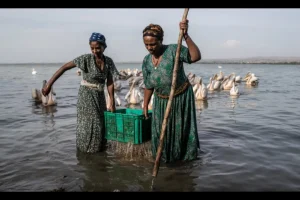BY ABEBE WOLDEGIORGIS
According to the fundamental economic principle, land is one of the economic components and when it is combined with capital and labor creating wealth will be realized. In Ethiopian history feudalism had been a dominant economic system for thousands of years. However, the land holding system had varied from place to place. In the northern part of the country the land tenure system was the ‘Rist’ system in which characterized by communal ownership and family members. They had the right to transfer land ownership right to their offsprings based on the customary law.
Contrary to this, in the central and southern parts of the country, the land holding system had been dominantly characterized by landlordism. Tenants had been denied the right to poses land and provide their labor to the land lords. And whenever the land lord wants, he could have the rights to evict them arbitrarily. Such land holding system prevailed for centuries and hampered the economic development and it was rather exploitative and pauperized tenants.
The 1974 revolution which brought the down fall of the monarchial system changed the old land owning system once and for all. The Derg regime which assumed power after the downfall of the old Imperial regime confiscated the land from the land lords and declared that land to be belongs to the government and to the tiller. Though the regime introduced new law, farmers had been remained in the obscure position. They were given only use rights of the land and as to economists, land became a dead capital because of the absence of the transaction value of land. The EPRDF regime which assumed power by overthrowing the Derg regime sustained the 1975 land proclamation and for the last three decades it was unchanged.
Recently, when the second home grown economic reform was introduced, the government showed its interest that the rural land system to be changed and to allow farmers to transact the land. Professor Melese Damite is working in the Land for Ethiopia Institute for many years and wrote various articles in relation with the land holding system in Ethiopia. He recently made an interview with the local media and reflected his view on this issue. As to him, the existing land holding system hampered the economic progress of the country.
He also said that, the government land ownership which is derived from socialist ideology is unhelpful for attaining economic growth because it is proved that raising land productivity with denying farmers’ sense of land ownership is impossible. Sense of ownership of land boosts farmer’s morale and increases productivity. He further said that, in Ethiopia farmers exert their labor for their farm at maximum level but their labor is not supported by knowledge, capital and technology. As a result, the output is less and stagnant. It is undeniable fact that farmers have their own traditional knowledge but it should go in line with the objective reality prevailed on the ground all over the world.
The increasing land degradation due to both by human activities and nature restricts land productivity. As to Melese, farmers residing in the areas where sufficient moisture and water is available can create wealth. But whenever they earn some amount of money, instead of using the money for supporting their farm activities, they allocate it for purchasing lorry, wind mills, open bar or purchase land in urban centers for residential house construction.
Had they invested their money on their land, it would have been improved their productivity but because of insecurity due to absence of ownership rights and fearing the government might take it as it wishes; they spend the money on the abovementioned purposes. Even when the government takes the land from farmers, the compensation money given to farmers is very much lower than the real value of the land. Paradoxically, the government will sell it again by lease with very expensive price. In some places, farmers grow eucalyptus trees not to lose their land with unfair compensation. They plant the tree for market and at the same time if the government takes the land the value of the land will be increased because of the availability of the trees.
All regions’ land proclamations do not allow farmers to build house on their farm lands. But contrary to these, farmers residing adjacent to urban centers build house on their farm to transfer assets to their children. Last time when he was on the visit in Benishangul gumuz region, he observed that farmers were engaged in building houses in their farm lands because due to their anxiety that they might lose property that is going to be provided to their children in case the government take away it. Such practice is regarded by farmers as it brings chance to help their children.
However, it put them at the loggerhead with the woreda and kebele agricultural bureau officials. Building confidence to farmers that they think they have the right to use the land by various means seemed a better option to face uncertainty in case they lose their land. If farmers feel secure that the land belongs to them, they would invest their money for long term and produce more than the usual production in their small plots of land.
For example, Netherlands is a country with small size of land area but its agricultural export products in 2021 was worth of 110 billion Dollars. Ethiopia annually earns only 3 billion Dollars by exporting products such as coffee, gold and others. As compared to Ethiopia, Netherlands geographical area is very small. Wealth is created by dedication and working not necessarily by geographic mass. Labor also must be supported by technology and knowledge. But the existing land holding system is a constraint factor to pull agricultural investment. As a result, land has been dead capital for long.
In Colombia, there are eight types of land holding system but in Ethiopia there is only one type of land holding system which lets land to be owned by government. Providing land position only to the government is unmanageable because it is pre occupied by many burning issues particularly governing the country, protecting the nation territorial integrity from foreign enemies and local destabilizing forces, exerting efforts for attaining economic development and other issues.
Currently, land used by few officials and brokers to obtain wealth illegally with in short period but the majority is denied access to land and such situation has been unhelpful to raise agricultural productivity. As to Melese, in rural parts, agriculture is not the only field which can engage farmers and there are also other options. For example, producing compost is a feasible job. It can be prepared in small plots of land. Even in the urban centers one can produce vermin worms helpful to prepare compost within 500 sq m of land and supply to the market. Such practice is common in India and many earn their living from producing vermin worms and supply to the market to be utilized as fertilizer.
These organic fertilizer producers earn more money than farmers. There are also other economic activities that can be done in rural parts but they need finance, knowledge and technology. To do these, land has to have transactional value to somehow. In Ethiopia, there are vast lands which can be changed in to trillion Dollars. However, the abundant resource is unutilized.
The new law regulation introduced in the second homegrown economic reform plan explains how to possess and utilize land in common and to that end legal frame work will be prepared. It also explains that there is an intention to improve land proclamation number 456/2005 which focuses on rural land administration and utilization. As to Melese, this is good news but as to him, the term “utilizing the land in common” is not clear whether it mean that husband and wife use the land in common or not and it is also not clear that whether they could obtain credit facility in common or not.
THE ETHIOPIAN HERALD WEDNESDAY 15 FEBRUARY 2023




